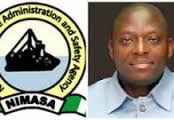The Federal High Court in Lagos on Tuesday dismissed the no-case submission filed by a former Director-General of the Nigerian Maritime Administration and Safety Agency, Calistus Obi, and three others in response to the allegation of N136m fraud levelled against them.
Justice Mojisola Olatoregun, in a ruling on Tuesday, held that the Economic and Financial Crimes Commission had made out sufficient case to warrant the defendants to defend themselves.
The judge noted that the evidence presented by the EFCC, through its eight witnesses and the 32 exhibits tendered, had not been disproved by the defendants.
She, therefore, ordered them to enter the dock and defend themselves.
“I have listened to the evidence of the prosecution and the defendants have not offered any explanation to the contrary.There is a prima facie case that has not been challenged, neither is the credibility of the witnesses in contention. I am satisfied that the defendants have case to answer. They are hereby directed to enter their defence,” Justice Olatoregun held.
She adjourned till March 22 and 23, 2017 for the defendants to open their defence.
Obi is standing trial alongside Alu Dismas and two companies: Grand Pact Nigeria Ltd. and Global Seal Nigeria Ltd.
They were accused of conspiring among themselves to convert N136m belonging to NIMASA to their personal use.
The offence, the EFCC alleged, was committed by the defendants on August 5, 2015.
The anti-graft agency said Obi and others acted contrary to sections 15 and 18(a) of the Money Laundering (Prohibition) (Amendment) Act, 2012.
But the defendants had pleaded not guilty after which the EFCC called eight witnesses and tendered 32 exhibits to substantiate its claims.
But at the close of the prosecution’s case on November 11, 2016, however, the defendants rather than open their defence filed no case submissions.
Their lawyers, Mr Wale Akoni (SAN) and Dr Joseph Nwobike (SAN), contended that the EFCC had made no case against their clients, to warrant them to enter any defence and urged the court to set them free.
Akoni, who is counsel for Obi and the two companies, maintained that there was nothing in the evidence adduced by the EFCC to show a prima facie case against his clients to warrant their entering any defence.
“Whatever a prima facie case is, it has to be in relation to the essential ingredient of the charge. It is not enough for the prosecution to bring all manners of evidence,” Akoni said, while urging Justice Olatoregun to dismiss the EFCC’s case against the 1st, 3rd and 4th defendants.
Similarly, Nwobike, who represented Dismas, maintained that the EFCC failed to prove that his clients conspired with Obi to commit the alleged crime.
“If My Lord looks at the evidence adduced by the prosecution in support of the count of conspiracy, My Lord will see that the essential element of proving conspiracy between 1st and 2nd defendants is non-existent.
“
There was no discussion, there was no agreement and no conclusion whatsoever between the 1st and the 2nd defendants,” Nwobike said, calling on the judge to “come to one conclusion that there is will be no basis for convicting the 2nd defendant of the offence of conspiracy.”
Nwobike further contended that the EFCC failed to prove the essential ingredient of money laundering against his client as provided under Section 15(1) of the Money Laundering (Prohibition) Act.
“The prosecution did not lead evidence to show that the 2nd defendant had reasonable knowledge that the money handed over to him is proceeds of an unlawful act,” Nwobike argued.
Responding, however, the prosecutor, Mr Rotimi Oyedepo, had maintained that the EFCC had raised enough issues that would warrant the defendants to defend themselves.
He said, “From the evidence of PW1 to PW8 and the documentary evidence that My Lord has admitted, can it be said that there is nothing linking the defendants to the alleged offence?
“The evidence on record before Your Lordship shows that funds belonging to NIMASA were transferred to the 2nd, 3rd and 4th defendants, who are being operated by the 1st defendant. We have shown that the monies were not used for official purposes. The question to ask is: where is the money?”
He argued further that the conspiracy count had been proven because the 2nd defendant was the one who knew a company, Coastal Mega, to whom a purported contract was awarded and also nominated the account into funds were transferred for the purported contract.
“The 2nd defendant did not stop at nominating the account, it was also him who transferred the money.
“I urge Your Lordship to hold that there was a meeting of minds to commit the alleged offence,” Oyedepo had said.
PUNCH
